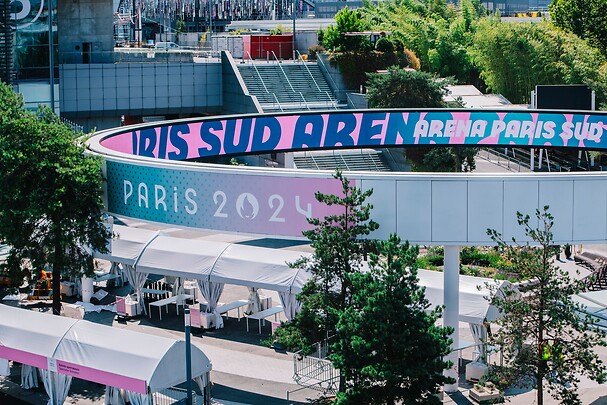
8.26.2024
10.16.2024
En cette fin de Jeux Olympiques et Paralympiques de Paris 2024, la France se remet de ses émotions. Déjà, une ère post-jeux se dessine dans l’héritage que l'événement mondial laissera derrière lui. L’héritage, c’est l’impact de l’organisation des Jeux, constaté sur l'infrastructure, l’environnement et la logistique du pays hôte lors de leur clôture. C’est aussi un moyen de mesurer la réussite économique et sociale d’une olympiade, ainsi que sa pérennité. Qu’en sera-t-il pour Paris 2024 ?

Alors que Paris s’est transformée le temps d’un été en vitrine internationale du sport, Paris 2024 entretenait en parallèle d’autres objectifs de long terme. Rendre la pratique physique la plus accessible possible en fait partie. Le but : donner l’opportunité à tous les Français de devenir athlètes, ou au minimum sportifs ! Parmi les mesures instaurées, l’État a promis une politique nationale de 30 minutes d’activité physique quotidienne obligatoire dans les écoles élémentaires, suivant l’installation de 5 000 infrastructures sportives pour l’ensemble de la population dans les quartiers de l’Hexagone.
Pour venir agrémenter les sports pratiqués au sol, Paris 2024 se jette à l’eau. La construction de 275 piscines dans des zones dépourvues de sports aquatiques et le programme « 1, 2, 3, Nagez ! », des cours de natation gratuits donnés à plus de 36 000 enfants en France (dont 9 400 en Seine-Saint-Denis), ont été pensés à la fois pour promouvoir la sécurité aquatique et pour dénicher le prochain Léon Marchand.
Et pour cultiver l’esprit et le loisir sportif auprès des jeunes, Paris 2024 a imaginé huit éditions de semaines Olympiques et Paralympiques, ainsi que le programme « Terre de Jeux », qui a déjà suscité l’organisation de 50 000 événements liés au sport par 4 500 villes et régions à l’occasion des olympiades.
Avec le fonds de dotation « Impact 2024 », le Comité Olympique a mis à disposition 47 millions d’euros pour soutenir des initiatives locales utilisant le sport pour améliorer les conditions de vie des femmes et des minorités dans une démarche de promotion de projets d’intérêt général.
En parlant de femmes, l’opération Paris Sportives a relevé le défi de briser la barrière symbolique entre sport féminin et masculin en proposant aux femmes de la capitale la pratique de disciplines traditionnellement réservées aux hommes, et ce gratuitement. Demain avec Elles, de son côté, continue de veiller, même après les Jeux, à ce que les jeunes Françaises puissent pratiquer le sport de leur choix en toute liberté.
Paris 2024 n’a pas non plus oublié nos aînés, qui peuvent maintenant rester actifs avec facilité grâce à Sport Senior en Plein Air. Ce soutien aux personnes âgées accompagne également une démarche d’aide aux personnes à mobilité réduite, par la construction de 3 000 clubs « para-accueillants » qui garantiront l'accessibilité des installations sportives pour tous. Et pour agir encore davantage pour l’intégration, l’Association Kabubu organise des tournois sportifs pendant lesquels les résidents et les réfugiés peuvent jouer et partager plus que du sport.
On l’a vu, quand il s’agit de préserver la santé mentale et physique des Franciliens, Paris 2024 mouille le maillot. Mais les effets bénéfiques du sport seront-ils similaires pour la croissance financière ? Ces olympiades ont fait pleuvoir des médailles pour la France, certes ; l’or a-t-il également atteint la trésorerie ? Selon des estimations pré-Jeux du Centre de droit et d'économie du sport (CDES), l’activité économique des Jeux de Paris 2024 dans la région métropolitaine de Paris devrait générer 8,9 milliards d'euros.
Des retombées économiques majeures, mais pas que :
Le sport, l’inclusion et l’économie font partie intégrante des programmes d’héritage de Paris 2024. Mais la pièce maîtresse, le clou du spectacle, ce sont les constructions et rénovations architecturales pour Paris et la région Île-de-France par la SOLIDEO.
Pour commencer, la Seine-Saint-Denis est la grande gagnante des Jeux de Paris 2024 : cœur battant de Paris 2024, la ville hôte du Village des Athlètes verra celui-ci se transformer en un nouveau quartier résidentiel, composé d’équipements de loisirs, commerciaux, communautaires et éducatifs, ainsi que 2 800 appartements, dont 25 % de logements sociaux, qui logeront 6 000 futurs Séquano-Dionysiens.
Le Centre aquatique, quant à lui, laissera place à une installation multisports comprenant des espaces de fitness, un mur d'escalade et un skatepark, entre autres. Enfin, à Élancourt, chef-lieu de l’épreuve de VTT, la colline où les vététistes roulaient pour s’arracher des médailles va devenir un parc sportif accessible à tous.
Au-delà du rayonnement des banlieues de la Ville Lumière, Paris 2024 sert aussi d’accélérateur d'assainissement de la Seine, qui sera rendue baignable pour tous les Parisiens à partir de 2025. Enfin, il a été évoqué que plusieurs installations propres à Paris 2024 demeureraient après 2024. Alors, que choisiriez-vous : un plongeon dans la Seine devant la Tour Eiffel décorée de ses anneaux olympiques, ou une balade dans le 18e arrondissement pour admirer les statues de la sororité, avec une vue imprenable sur la vasque aux Tuileries en contrebas ?
Alors que les enjeux climatiques pèsent plus que jamais, les Jeux Olympiques et Paralympiques de Paris 2024 doivent se réinventer. En s'inspirant des modèles du passé et en innovant dans les domaines de l’inclusion et dans l’organisation hyper-urbaine des épreuves et de la cérémonie, Paris 2024 ne se contente pas d'établir une nouvelle norme pour ses propres Jeux, elle place la barre plus haut pour les futurs événements sportifs. En collaboration avec le Comité International Olympique et des organismes internationaux, la ville a décidé d'actualiser, d'introduire et de mettre en œuvre des normes de responsabilité environnementale dans l’événementiel.
En démontrant une audace et une maîtrise à toute épreuve, les Jeux Olympiques et Paralympiques de Paris 2024 ont dépassé toutes les attentes. Grâce à un plan d’héritage mesuré, les Jeux de Paris 2024 comptent bien garantir un avenir économique, culturel et social radieux, non seulement pour la capitale hexagonale mais pour l’ensemble du territoire français, que le monde n’est pas près d’oublier.
Mais qu’en est-il de Viparis dans tout ça ? Nous y reviendrons dans le dernier article de notre newsletter Destination Paris. Tenez-vous prêt pour de l’émotion et des exclusivités ! [et abonnez-vous à notre newsletter !]